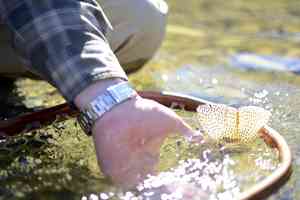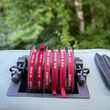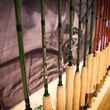Fly fishing for trout isn’t rocket science, even though it seems like we try to make it so at times. If you present your fly to trout in a natural or somewhat natural manner, you stand a good chance of fooling many of them. The key to achieving that natural or somewhat natural presentation is fly casting. But the truth is, you don’t need to be a master fly caster to be a successful angler. You do, however, need to be proficient. The journey to becoming a proficient fly caster need not be a long and arduous one, but frequent practice and a deliberate focus on the fundamentals of casting is the roadmap to success.
As you develop your own personal fly casting roadmap, these tips will help.
Don’t try to learn it all at once
Modern fly fishing culture seems infatuated with hacks and shortcuts that promise quick and easy success. But it takes time to learn proper casting skills and attempting to do too much at one time will yield subpar results and frustration. You can’t learn to be a proficient fly caster in one day, but you can do so over time. Begin by practicing one or two specific skills. Once those skills are mastered, move on to the next step.
Think of this as your casting foundation or pyramid—start with the core movements and then move on to more specialized movements. And while you can’t learn it all in one day, don’t worry, mastery of the basic fly casting principles can be achieved in less time than you think. Within a few days of deliberate practice on the yard or grass, you will have the confidence and skills necessary to approach moving water. As you progress, make it a habit to spend a few hours practicing your fly casting each week and you’ll be surprised how quickly your quiver of fly casting tools will begin to fill.
Practice without a fly rod in your hand
Good casting is little more than the development of good mechanics. Casting without a rod allows you to focus solely on the muscle movements or mechanics of the cast. Adding a fly rod and line does nothing but add complexity. Practice the casting movements without a rod until they feel natural, and only then would I suggest casting a rod. Even after 36 years of fly casting, I frequently find myself beginning to make a bad cast. When this happens, I put the rod down or hold the rod in my non-casting hand and spend a minute or two working on the casting movement with just my arm and body.
This summer, my brother was teaching the fundamentals of casting with a two-handed rod on the Yellowstone River. As someone who is naturally impatient, within 10 minutes I was frustrated and found myself trying to overpower my cast, which resulted in poor mechanics and a bad cast. The cure was putting the rod down for a few minutes and working on both hand movements without the rod. Only then did the situation improve. This is my casting reset button, and it works wonders.
If you don’t know where to start, do some research and find a few credible YouTube casting videos.
Take a break when you’re fatigued
Fishing and fly casting while tired creates bad habits. I’m as driven as most anglers to spend as much time as possible on the water, but after years of fishing, I’ve begun to listen to my body when I feel fatigued. If I feel I’m forcing my cast, I take a break. This frequently happens to me when I’m fishing for Musky. It doesn’t take long for even an experienced fly caster to become fatigued when using a heavy rod to cast large, wind-resistant flies.
Most of us develop our bad casting habits when we're tired. This is one of the main reasons why I no longer offer 8-hour guided trips or lessons. Most anglers’ skills begin improving during the morning, peak around mid-day, and then quickly deteriorate as fatigue sets in. In my experience, few anglers are physically capable of fishing a solid 8 hours in one day.
If you’re just starting out and are still developing your casting muscles (yes, there are casting muscles), fatigue can set in quickly. Take a 10-15 minute break the moment you feel tired or feel you’re rushing or forcing your cast. And, if you plan to fish all day, plan to take some breaks when fatigue sets in. If you don’t, you’ll soon begin developing poor casting habits.
Watch Videos of Yourself
Watching GoPro or other footage of yourself casting may be the ultimate form of fly casting feedback. As an angling instructor at Penn State University, I had to make the shift from in-person instruction to virtual during the peak of the COVID pandemic. I started using my GoPro to film “virtual field trips” for my students. When I returned home to edit the footage I had filmed, I quickly noticed I had several bad casting habits I wasn’t even aware of—using too much arm movement or rocking my body from side to side during. I had developed these poor casting habits over time, but wasn’t aware I needed to correct them until I saw them on camera.
Wrapping Up
It doesn’t take a lifetime to become a proficient fly caster and achieve success on the water. I’ve seen many of my students become not just proficient, but excellent fly casters and anglers within 6-9 months. What all of those anglers had in common was a dedication to deliberate and frequent practice. Commit to doing the same, and you’ll achieve your fly casting goals sooner than you think.





























Comments
Alan Harrison replied on Permalink
I am now using a Scandi line with my Spey rod for lake fishing. Huge improvement with no backcasts.
Tony Baird replied on Permalink
Caught my first salmon 58 years ago. 6 years old my dad put me between 2 of his friends, dad didn't know how to cast or read water. His friends, Sam parrot and Jimmy John taught me everything pass onto kids today. I can be found on the exploits or gander rivers mainly everyday the season is open. Every year someone, anyone, who sees me fishing asks me to help teach sons or grandsons/daughters. Makes an old river rat like me feel good. My geezer friends all do the same.
Kerry M Gubits replied on Permalink
I can't help it! Seeing the size of the nets people are carrying these days - like in the photo - has me in hysterics. Good luck! I hope you fill it! Hahahaha!
COURT MACKID replied on Permalink
If your casting starts to fall off, try closing your eyes and feel the cast. This focuses your brain only on the cast. Sight is not involved. It also increases brain memory.
Pages